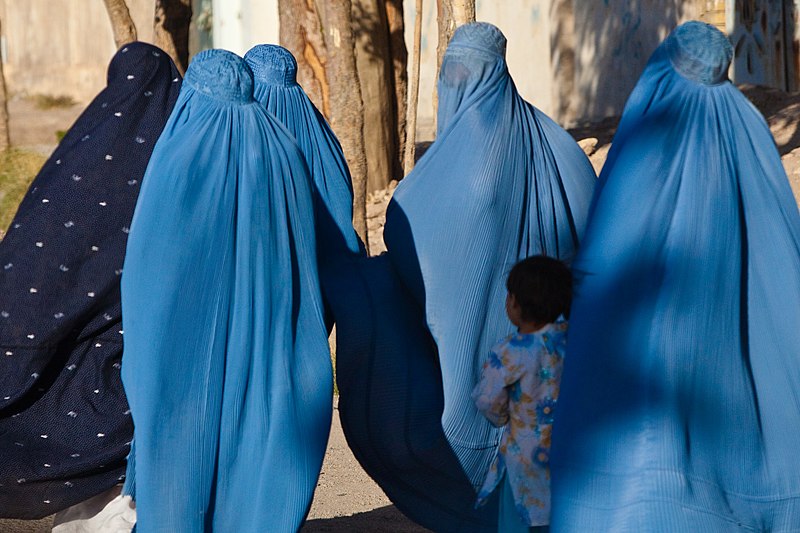The Taliban has increasingly imposed restrictive policies on Afghan women and girls months since retaking control of Afghanistan. A UN expert who visited the country said the restrictive policies by the insurgent group look to make women and girls “invisible” in Afghan society.
The UN special rapporteur on human rights in Afghanistan Richard Bennett told reporters in Kabul this week that the insurgent group’s policies on women and girls are increasingly showing “a pattern of absolute gender segregation and are aimed at making women invisible in society.”
“The de facto authorities have failed to acknowledge the magnitude and gravity of the abuses being committed, many of them in their name,” said Bennett.
This follows the recent decree by the Taliban’s supreme leader Haibatullah Akhunzada that all Afghan women must be covered, including their faces, preferably with the traditional burqa. The insurgent group has since imposed restrictions on women in accordance with their interpretation of Islam.
Teenage girls were shut out from schools, while women were no longer allowed to travel alone and have been laid off from certain government jobs.
Bennett’s comments also come amidst the Taliban’s intervention at a women’s protest Thursday, demanding that secondary schools for girls must be reopened. Taliban officials did not state a clear reason for the shutdown but said that the schools would be reopened soon.
Foreign governments have said that the Taliban’s record on human rights, especially the rights of women and girls, would be a big factor in determining whether the group’s administration would be officially recognized.
The United Nations National Security Council recently called on the Taliban to reverse its restrictive policies on women and girls.
The council said in a statement that they have expressed concerns about the insurgent group’s policies on women and girls, including limiting access to education, employment, “freedom of travel, and women’s full, equal, and meaningful participation in public life.”
The council said the policies are restricting “the human rights and fundamental freedoms of Afghan women and girls” and demanded that schools for girls be reopened immediately.
The council also expressed concerns about the current situation in the country in terms of humanitarian, social, political, and economic issues, citing the “terrorist” attacks that target civilians.



 Trump Says “Very Good Talks” Underway on Russia-Ukraine War as Peace Efforts Continue
Trump Says “Very Good Talks” Underway on Russia-Ukraine War as Peace Efforts Continue  Bosnian Serb Presidential Rerun Confirms Victory for Dodik Ally Amid Allegations of Irregularities
Bosnian Serb Presidential Rerun Confirms Victory for Dodik Ally Amid Allegations of Irregularities  U.S.-India Trade Framework Signals Major Shift in Tariffs, Energy, and Supply Chains
U.S.-India Trade Framework Signals Major Shift in Tariffs, Energy, and Supply Chains  Trump Backs Nexstar–Tegna Merger Amid Shifting U.S. Media Landscape
Trump Backs Nexstar–Tegna Merger Amid Shifting U.S. Media Landscape  China Warns US Arms Sales to Taiwan Could Disrupt Trump’s Planned Visit
China Warns US Arms Sales to Taiwan Could Disrupt Trump’s Planned Visit  Nicaragua Ends Visa-Free Entry for Cubans, Disrupting Key Migration Route to the U.S.
Nicaragua Ends Visa-Free Entry for Cubans, Disrupting Key Migration Route to the U.S.  Trump Administration Appeals Court Order to Release Hudson Tunnel Project Funding
Trump Administration Appeals Court Order to Release Hudson Tunnel Project Funding  US Pushes Ukraine-Russia Peace Talks Before Summer Amid Escalating Attacks
US Pushes Ukraine-Russia Peace Talks Before Summer Amid Escalating Attacks  Japan’s Prime Minister Sanae Takaichi Secures Historic Election Win, Shaking Markets and Regional Politics
Japan’s Prime Minister Sanae Takaichi Secures Historic Election Win, Shaking Markets and Regional Politics  Jack Lang Resigns as Head of Arab World Institute Amid Epstein Controversy
Jack Lang Resigns as Head of Arab World Institute Amid Epstein Controversy  Trump Signs Executive Order Threatening 25% Tariffs on Countries Trading With Iran
Trump Signs Executive Order Threatening 25% Tariffs on Countries Trading With Iran  New York Legalizes Medical Aid in Dying for Terminally Ill Patients
New York Legalizes Medical Aid in Dying for Terminally Ill Patients  Trump Slams Super Bowl Halftime Show Featuring Bad Bunny
Trump Slams Super Bowl Halftime Show Featuring Bad Bunny  Israel Approves West Bank Measures Expanding Settler Land Access
Israel Approves West Bank Measures Expanding Settler Land Access  Sydney Braces for Pro-Palestine Protests During Israeli President Isaac Herzog’s Visit
Sydney Braces for Pro-Palestine Protests During Israeli President Isaac Herzog’s Visit  Taiwan Says Moving 40% of Semiconductor Production to the U.S. Is Impossible
Taiwan Says Moving 40% of Semiconductor Production to the U.S. Is Impossible  Ohio Man Indicted for Alleged Threat Against Vice President JD Vance, Faces Additional Federal Charges
Ohio Man Indicted for Alleged Threat Against Vice President JD Vance, Faces Additional Federal Charges 































